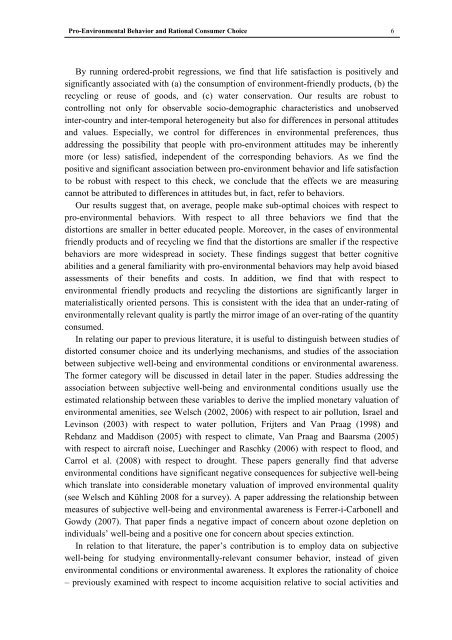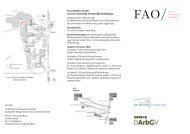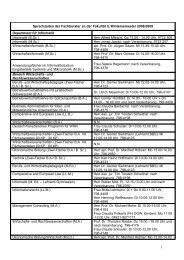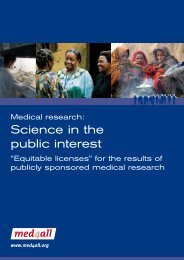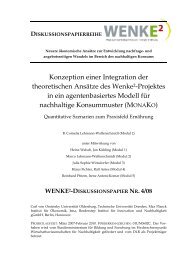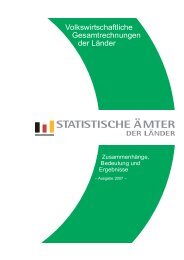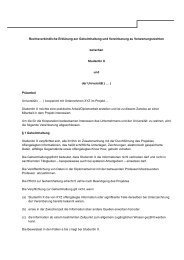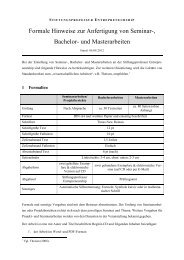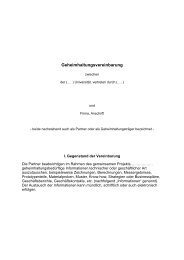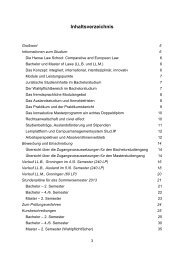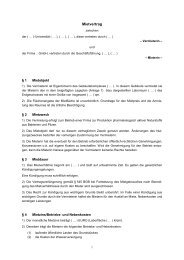Pro-Environmental Behavior and Rational Consumer Choice
Pro-Environmental Behavior and Rational Consumer Choice
Pro-Environmental Behavior and Rational Consumer Choice
Create successful ePaper yourself
Turn your PDF publications into a flip-book with our unique Google optimized e-Paper software.
<strong>Pro</strong>-<strong>Environmental</strong> <strong>Behavior</strong> <strong>and</strong> <strong>Rational</strong> <strong>Consumer</strong> <strong>Choice</strong> 6<br />
By running ordered-probit regressions, we find that life satisfaction is positively <strong>and</strong><br />
significantly associated with (a) the consumption of environment-friendly products, (b) the<br />
recycling or reuse of goods, <strong>and</strong> (c) water conservation. Our results are robust to<br />
controlling not only for observable socio-demographic characteristics <strong>and</strong> unobserved<br />
inter-country <strong>and</strong> inter-temporal heterogeneity but also for differences in personal attitudes<br />
<strong>and</strong> values. Especially, we control for differences in environmental preferences, thus<br />
addressing the possibility that people with pro-environment attitudes may be inherently<br />
more (or less) satisfied, independent of the corresponding behaviors. As we find the<br />
positive <strong>and</strong> significant association between pro-environment behavior <strong>and</strong> life satisfaction<br />
to be robust with respect to this check, we conclude that the effects we are measuring<br />
cannot be attributed to differences in attitudes but, in fact, refer to behaviors.<br />
Our results suggest that, on average, people make sub-optimal choices with respect to<br />
pro-environmental behaviors. With respect to all three behaviors we find that the<br />
distortions are smaller in better educated people. Moreover, in the cases of environmental<br />
friendly products <strong>and</strong> of recycling we find that the distortions are smaller if the respective<br />
behaviors are more widespread in society. These findings suggest that better cognitive<br />
abilities <strong>and</strong> a general familiarity with pro-environmental behaviors may help avoid biased<br />
assessments of their benefits <strong>and</strong> costs. In addition, we find that with respect to<br />
environmental friendly products <strong>and</strong> recycling the distortions are significantly larger in<br />
materialistically oriented persons. This is consistent with the idea that an under-rating of<br />
environmentally relevant quality is partly the mirror image of an over-rating of the quantity<br />
consumed.<br />
In relating our paper to previous literature, it is useful to distinguish between studies of<br />
distorted consumer choice <strong>and</strong> its underlying mechanisms, <strong>and</strong> studies of the association<br />
between subjective well-being <strong>and</strong> environmental conditions or environmental awareness.<br />
The former category will be discussed in detail later in the paper. Studies addressing the<br />
association between subjective well-being <strong>and</strong> environmental conditions usually use the<br />
estimated relationship between these variables to derive the implied monetary valuation of<br />
environmental amenities, see Welsch (2002, 2006) with respect to air pollution, Israel <strong>and</strong><br />
Levinson (2003) with respect to water pollution, Frijters <strong>and</strong> Van Praag (1998) <strong>and</strong><br />
Rehdanz <strong>and</strong> Maddison (2005) with respect to climate, Van Praag <strong>and</strong> Baarsma (2005)<br />
with respect to aircraft noise, Luechinger <strong>and</strong> Raschky (2006) with respect to flood, <strong>and</strong><br />
Carrol et al. (2008) with respect to drought. These papers generally find that adverse<br />
environmental conditions have significant negative consequences for subjective well-being<br />
which translate into considerable monetary valuation of improved environmental quality<br />
(see Welsch <strong>and</strong> Kühling 2008 for a survey). A paper addressing the relationship between<br />
measures of subjective well-being <strong>and</strong> environmental awareness is Ferrer-i-Carbonell <strong>and</strong><br />
Gowdy (2007). That paper finds a negative impact of concern about ozone depletion on<br />
individuals’ well-being <strong>and</strong> a positive one for concern about species extinction.<br />
In relation to that literature, the paper’s contribution is to employ data on subjective<br />
well-being for studying environmentally-relevant consumer behavior, instead of given<br />
environmental conditions or environmental awareness. It explores the rationality of choice<br />
– previously examined with respect to income acquisition relative to social activities <strong>and</strong>


